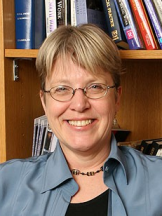Research drawing on perspectives of social work, anthropology can help solve difficult human problems, says Wayne State SWAN lecturer

Transdisciplinary training in social work and anthropology can help scholars better understand "elusive factors" that influence individuals' health and wellbeing but are difficult to capture using popular research methods, a public health expert told a Wayne State audience on Feb. 15.
Deborah K. Padgett, professor of social work and public health at New York University, delivered the 2017 Social Work and Anthropology (SWAN) lecture on "Theory & Method Matters: Finding the Right Combination." Speaking at Wayne Law's Spencer M. Partrich Auditorium, Padgett discussed the need for more research describing the mechanisms through which structural factors such as economic and social inequalities affect people on a daily basis. She urged increased scholarship focusing on the interaction of what she termed "upstream" determinants of health such as economic and social policies and "downstream" determinants such as biology and behavior.
Too often, said Padgett, scholars allow their research questions to be guided by the research methods in which they have been trained. Combining perspectives from social work and anthropology, she said, can promote "flexibility in methods and theoretical allegiances," leveraging both disciplines' rootedness in, and understanding of, the environments where research takes place. When it comes to theory and methods, Padgett concluded, scholars must acknowledge the complexity of human problems and avoid methods-driven approaches that overlook upstream influences. In the research on homelessness that Padgett highlighted, this could mean incorporating qualitative methods to enrich theoretical thinking.
An international expert on homelessness, particularly among adults with co-occurring mental and substance use disorders, Padgett is known for her advocacy and practice of integrating ethnographic and mixed methods in research. Delivering the SWAN lecture, Padgett shared her experience as principal investigator of two R01 qualitative methods studies funded by the National Institute of Mental Health. The first was a $1.4 million study of service engagement among dually diagnosed homeless adults in New York City designed to elicit consumer perspectives on recovery and services for homelessness, mental illness, and substance abuse. The second was a $1.9 million study using ethnographic methods and in-depth interviews to examine the role of housing in mental health recovery among formerly homeless adults.
Padgett, who is also professor of psychiatry at NYU School of Medicine, has a doctoral degree in anthropology from the University of Wisconsin-Milwaukee, a Master of Public Health and post-doctoral training in public health from Columbia University, and post-doctoral training in psychiatric epidemiology (Duke University). She has published extensively and held leadership roles with the Society for Social Work and Research, which in 2006 announced the Deborah K. Padgett Early Career Fellowship in recognition of her contributions.
SWAN is an innovative transdisciplinary doctoral degree in social work and anthropology focusing on urban issues and providing training in the skills, content, and theory of both disciplines. For more information on the degree, visit http://www.clas.wayne.edu/swan or contact Faith Hopp, social work doctoral program director, at faithhopp@wayne.edu.